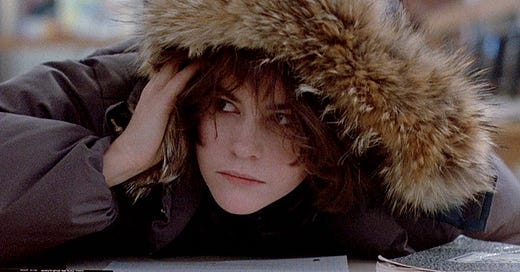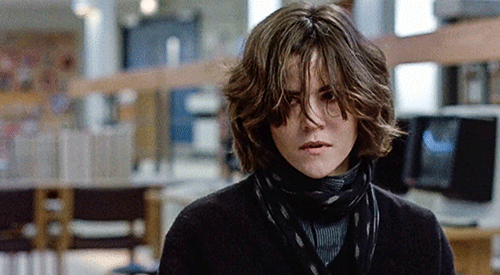The Rise of Allison
A combination of trans activism and social media has given power to the recluse
In 1985 the youth pastor at my evangelical church recommended that all of us in the Junior High program (Middle School, in today’s vernacular) go see The Breakfast Club. This was the same youth pastor who generally, and vocally, refused to see R rated movies. But he felt like this film was important.
Of course, when I saw it, it resonated. I was 13 and the archetypes in the movie made perfect sense to me. There was: some preoccupied adults who deserved little respect, a jock, a princess, a burn-out, a brainy nerd, and “the basket case” as Allison Reynolds describes herself.
The Breakfast Club seems to holds up. Not only did my Boomer pastor like it back in 1985, but my kids really like it today.
And I think its because the archetypes of the movie speak truth.
Don’t get me wrong, you will find no shortage of criticisms of The Breakfast Club online. And no shortage of criticism of the archetypes portrayed in the film.
But that, to me, only validates that writer/director John Hughes got something right. Its an itch worth scratching. He was able to distill dozens of people groups into 5 common youth archetypes found in every high school in America.
Are they generalized? Yes. Are they perfect? No. But do they reveal truth? Yes.
From archetypes to hierarchies
I won’t dwell on this too much but generally speaking I believe that archetypes, and hierarchies that emerge from them, are earned. They are usually organic and they are usually accurate. Not always, but usually.
And there are two ways to look at the hierarchies related to archetypes and subsequent power dynamics. First you could look at the hierarchies within each archetype. Like, was Bender the king of the drop-outs (or like Farmer Ted in Sixteen Candles as “the king of the dipshits.”)
Second you could look at the competition across hierarchies. The king of ALL.
What I remember about High School is that I had no desire to be rise beyond the hierarchy that I was in. My sub-group of friends at that time would likely have fallen into the jock archetype laid out in The Breakfast Club, but there are elements of the drop-out archetype and the brain archetype that resonate with me as well.
That said, let’s assume for the sake of ease that everyone has the same desire to rise to the top of both their own archetype hierarchy and ALL the other hierarchies as well.
Then who do you want to be king of all? Who would you choose?
I think there would be some debate among four of the archetypes—jock, princess, drop-out, and brain.
However, I believe among the four archetypes there would be near-universal agreement that the basket case should not have that type of power.
They would suck at it.
What is it about the basket case?
I knew the “Allison”-types in my schools growing up. John Hughes clearly merged several stereotypes into Allison—different sub-groups represented in the basket case archetype. They were recluses and unapproachable. They were not dumb, but not overly intelligent. They could be poignant but they were also dangerous. They were pathological but highly functional. They were antisocial, neurotic and checked many of the boxes of a sociopath (ignoring social norms, overstepping social boundaries, deceitful, difficulty controlling impulses and planning for the future, acting without considering the consequences).
I grew up with an Allison. She was my sister. I knew her very well and not at all. But she was totally predictable. For example, I knew that if I gave my sister any sort of positive attention she would not leave me alone. She would “glom on” to me. She would embarrass me.
For this reason I did my best to ignore her. I made her irrelevant in my day.
I walked by her almost every day in the lunchroom. She sat alone with no friends. I went to my table with the class clowns and “normals”—the jocks, according to John Hughes.
Sounds horrific doesn’t it? I let my sister eat alone every day and did nothing about it. Saying that out-loud is a bit jarring.
However, I was a teenager myself with teenager issues. And my sister needed professional help that I was not equipped to offer.
I promise you: there was no other way. The basket case archetype that defined my sister was simply incompatible with common social norms. My sister was a recluse because she could not socialize well—it always came out wrong.
The new Allisons
Today’s Allisons are the green-haired, short-banged trans activist. They are the masked, unshowered, antifa, leftist militia rioters. They are the aspgergers, don’t fit in, gamer, porn addicts.
The Marxist rallying cry for equity, coupled with social media, has enabled the fifth archetype an opportunity to take a crack at power across all archetypes.
Image that. People totally inept at socializing have power outside of their antisocial hierarchy.
Remember, you don’t have to be a social being to be on social media. But you can use social media to influence social beings. Want to totally CRUSH a jock archetype? Just destroy his life on social media.
An Allison with power is just what we knew they would be: trouble.
But equity…
I know I know. This line of thinking will piss people off. It’s antithetical to today’s equity mantras.
But results matter. And every tree should be measured by its fruit. Life isn’t better, for anyone, when the basket case has power—not even for themselves.
The antifa-types are literally trying to destroy everything and drive society into anarchy. They are a tool of people smarter than them (and are totally unaware). The brains behind antifa are using these allisonian nihilists to destroy things just enough until they can rebuild something more communist.
But the Allisons of antifa are being used by people WHO KNOW that if they handed full power over to antifa, then everything would be destroyed and anarchy would rule.
Meanwhile, the incels that make up the gamer/porn world would prefer a virtual world where their avatar could live it’s best life. The metaverse is a future utopia. These poor dudes (they are mostly guys) are just atm machines for the elite. They are subscribers: to facebook, to amazon, to grubhub, to big pharma (none of them are healthy).
But worst of all are the trans activists. Not because I, or America, particularly dislikes true gender dysphoric people (“…literally denying my right to exist!”). In fact, I have tremendous empathy for the few people I love who have gone through these struggles.
No. The trans activists are a problem because their movement has co-opted that tiny group of dysphoric people and created a fake supergroup of Allison-left-overs. The trans activists are a power-hungry ruse spinning lies upon lies to very vulnerable people—mostly kids.
Today’s Allison has a remedy to their antisocial behavior. And no it is not being a better person or learning a skill or spending time making mistakes from which to learn from.
No. Today’s Allison can simply obtain power—real power—by identifying as something. That’s it. Just say you identify as Two Spirit and you have actual power. Say you identify as a cat and you can literally demand a litter box in your middle school restroom.
Worse, say you are the victim of a wrong look or an insensitive comment or a “micro-aggression” and you can take down a school administrator. You can get a university to pull a princess’ scholarship. You can close a bakery with a petty lawsuit or bad press.
That is power.
And we knew, even in high school, that THAT is what Allison would do with power.








Damn, that was good. Excellent piece.
Excellent analysis